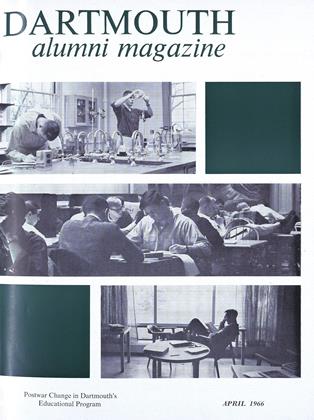THE NCAA'S 1.6 rule is causing more commotion among college-aged kids than anything since 3.2 beer in World War 11.
The national collegiate body wrote this legislation a year ago. It collided head-on with Ivy League principles this winter. And as of March 6 all eight colleges in the Ivy group have refused to participate in NCAA events, i.e. the postseason championships in sports such as basketball, hockey, and swimming.
Dartmouth and the other Ivy schools have not withdrawn from the NCAA. In the year ahead the group will continue to oppose the rule and seek to have it amended or revoked.
Here's the background on this controversy which has raged for the past two months:
At the January 1965 NCAA Convention the 1.6 rule was adopted by a sizable majority which did not include the Ivy League and many other Eastern schools.
The rule stated that financial aid may not be granted to incoming student-athletes unless they have a predictive minimum grade average of at least 1.6 based on a maximum of 4.0, nor may these student-athletes participate in athletics. Once on campus student-athletes must maintain at least a 1.6 average in order to receive financial aid and to remain eligible for athletic competition.
The rule was not to take effect until this past February. The NCAA declared that any college not in compliance with the rule by then would be barred from NCAA events.
The Ivy Group expressed itself as being in sympathy with the objectives but opposed to the means being taken. It notified the NCAA through Princeton president Robert F. Goheen, who is current chairman of the Ivy Policy Committee, that the Ivy Group forbids athletic scholarships and that "athletes shall be admitted as students and awarded financial aid only on the basis of the same academic standards and economic need as are applied to all other students." On the question of eligibility, the Ivy Group maintained that it is "the authority of the faculty of each NCAA member institution to determine good standing and satisfactory progress toward a degree."
The NCAA's response to the question of financial aid was in effect to agree with the Ivy Group position. President Everett Barnes (Colgate athletic director) stated, "The financial aid provisions of this legislation do not affect an institution if it awards scholarships or grants-in-aid without consideration whatsoever of the recipient's athletic ability."
The key issue became that of eligibility to participate. Here agreement was sought on the grounds that since the Ivy Group standards are well within the objective of the 1.6 rule, the NCAA might so regard them without requiring certification.
The NCAA was willing to accept this position if the Ivies would file a statement of the standards and testing measures used in the admission of freshmen.
But here the negotiations failed because the individual responses varied.
Dartmouth filed the statement requested and was declared eligible. So were Princeton, Cornell and Columbia. The hitch came with the Penn and Yale responses. Both colleges prefaced their information with the statement that they were not in compliance with the rule but were in conformity. Harvard, meanwhile, had not been heard from. Athletic officials said that Harvard still had not decided upon a course of action when the Penn-Yale situation was made public.
The upshot of an exchange of telegrams seeking clarification was that Penn and Yale were declared ineligible. Thereupon President Goheen notified the NCAA that "the eight members of the Ivy Group have determined that they must all accept ineligibility for such (NCAA-sponsored) events."
The immediate result of this action was to drop the Dartmouth swimming team from the NCAA championships along with swimmers and hockey, basketball and fencing teams at other Ivy schools. The Big Green ski team, Eastern champion, had already passed up the NCAA's that weekend in Colorado because of exam conflicts and travel expense. Other Dartmouth winter teams had not qualified for NCAA events although the ruling later could affect spring squads such as baseball, track, tennis and golf.
President Goheen in his March 5 statement said that the cardinal issues are contained in the following three questions:
(1) Do you believe that athletes should be treated differently than other students?
(2) Do you believe that an athletic organization should seek to determine academic policy?
(3) Do you believe that a student with a low grade average should automatically be debarred from participation in sports and from financial aid, no matter what his stage of development and no matter what his academic potential?
The Ivy League position was "No" on each of these questions.
 View Full Issue
View Full Issue
More From This Issue
-
 Feature
FeatureTo Keep Pace with America
April 1966 -
 Feature
FeaturePostwar Change in Dartmouth's Educational Program
April 1966 By C.E.W. -
 Feature
FeatureDartmouth's "New" Curriculum
April 1966 By JOHN HURD '21, PROFESSOR OF ENGLISH EMERITUS -
 Article
ArticleThe Undergraduate Chair
April 1966 By LARRY GEIGER '66 -
 Class Notes
Class Notes1920
April 1966 By GEORGE H. MACOMBER, JOHN S. MAYER -
 Article
ArticleThe Faculty
April 1966 By GEORGE O'CONNELL







